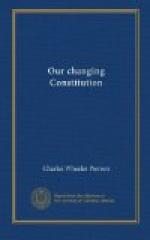[Footnote 2: 159 N.Y., p. 75.]
Apparently the same rule would be applicable were the granting of patent rights, like the granting of ordinary corporate franchises, a prerogative reserved under our system of government to the states instead of being expressly conferred on the United States. By parity of reasoning, the Federal Government in that case would have no power to tax them.
It is familiar law, reiterated over and over again by the Supreme Court, that Congress cannot tax the means or instrumentalities employed by the states in exercising their powers and functions, any more than a state can tax the instrumentalities similarly employed by the General Government. Thus, it has been held that Congress cannot tax a municipal corporation (being a portion of the sovereign power of the state) upon its municipal revenues[1]; that Congress cannot impose a tax upon the salary of a judicial officer of a state[2]; that Congress cannot tax a bond given in pursuance of a state law to secure a liquor license.[3]
[Footnote 1: United States vs. Railroad Co., 17 Wall., 322.]
[Footnote 2: Collector v. Day, 11 Wall., 113.]
[Footnote 3: Ambrosini v. United States, 185 U.S., 1.]
In the light of these decisions it is not apparent how Congress can tax the franchises of those state corporations (and they are many and important) which perform some public or quasi-public function. A state, to carry out its purposes of internal improvement, charters an intrastate railway or ferry company with power to charge tolls and exercise the right of eminent domain. Is not the grant of corporate existence and privileges to such a corporation one of the means or instrumentalities employed by the state for carrying out its legitimate functions, and is not a tax by the Federal Government upon the exercise by such a corporation of its corporate powers an interference with such means or instrumentalities?
In any discussion of the right of Congress to tax the agencies of or franchises granted by a state, the distinction must be borne in mind between a tax upon property acquired by means of the franchise from the state and a tax upon the exercise of the franchise itself. The former tax may be perfectly valid where the latter would be unconstitutional. Thus, the Supreme Court has upheld a tax by a state upon the real and personal property (as distinct from the franchises) of a railway company chartered by Congress for private gain, while conceding that the state could not tax the franchises, because to do so would be a direct obstruction to federal powers.[1]
[Footnote 1: Union Pacific Railroad Company vs. Peniston, 18 Wall., 5.]




